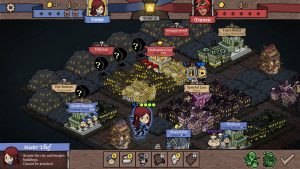Antihero is a very interesting take on board game design that is finally out of early access. This is one of those games that can either be love at first sight, or a hard push in the opposite direction. While it won’t necessarily be for everyone, this is a great game if you can get some friends together.
Stealing Fun:
Antihero is an example of a game that looks simple on the outside, but has hidden depth; especially when played against other players.
Each turn, you can perform actions with your master thief around the board. Collecting gold is used to hire people, with the cost progressively getting more expensive when used repeatedly on the same turn. Lanterns unlock upgrades that vary from new people, to more actions and so on.
The game is turn-based, and can be played online or with play by email. Winning requires you to collect enough victory points before the other players. Depending on the map that you’re playing, there may be more or less ways of earning victory points.
At the start of the game, players are going to be scouting the map in order to reveal the fog of war and figure out the major points. Once sides are established, it then becomes a battle to control the map and reduce your opponent’s options and resources.
The game comes with a single player campaign that introduces the rules and has additional modifiers, but the real meat is the multiplayer.
Picking Pockets:
Antihero is a unique game to play; helped by a great visual aesthetic and sound design. Starting out, games are about feeling out the other player to decide your plan of action. Moving into the mid-game, the match becomes about who can outplay whom.
Advanced characters you can hire include a roaming gang that levels up after dealing with units on the board, the truant officer who removes urchins, a demolitionist who traps building and more. The idea is to figure out how to hurt your opponent for more than it would cost you. Hiring a truant officer is expensive, and is only worth it to clear out a fully taken over building.
Antihero’s mechanics and rules have been refined to a tee, but that may be to some determent.
Caught:
Antihero’s rule set and options are hard coded, as per tabletop design rules. There are only so many actions that you can make use of during a turn; some limited by design and some by the map. This means there is an inherent limitation in terms of variety; a problem that many TBS can suffer from.
Once you figure out the best options, a lot of the playing of Antihero goes away. Now you may argue that having a human opponent can solve that, and yes it can, but only to some extent. As I said in the last section, the mid to end game becomes about locking down your opponent.
Whoever gets the leg up in the mid-game can easily secure the rest of the game. You can stop your opponent from getting enough resources to remain competitive and sweep things. This can easily lead to a situation when the game is pretty much over, but you still have to play until the other player wins.
Fortunately, if the game does well enough to warrant additional content, adding in more maps and win conditions can easily mix things up going forward.
The Perfect Heist:
It takes a lot of work and iteration to design your own board game; virtual or physical, and Antihero is a great time. If you can get a group of friends who love thieving as much as you, the charm and design should keep you coming back for more.



